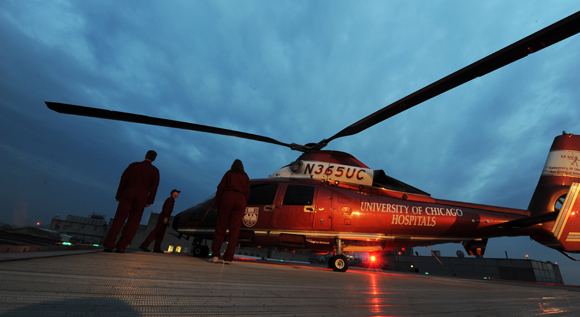| Sun | Mon | Tue | Wed | Thu | Fri | Sat |
|---|---|---|---|---|---|---|
| 1 | 2 | 3 | 4 | 5 | ||
| 6 | 7 | 8 | 9 | 10 | 11 | 12 |
| 13 | 14 | 15 | 16 | 17 | 18 | 19 |
| 20 | 21 | 22 | 23 | 24 | 25 | 26 |
| 27 | 28 | 29 | 30 | 31 |
CATEGORIES
RECENT ENTRIES
BLOG ROLL
Errand of mercy

It was close to 7 p.m. that I got word we were going to fly. I had been waiting since dawn to go on a run with the University of Chicago Aeromedical Network helicopter, but an unusual fog had kept the helicopter grounded most of the morning, while a lack of beds at the University of Chicago Medical Center’s intensive care unit had kept us from flying through the afternoon.
Finally, the call came in: a man in Community General Hospital in Munster, Indiana, 23 miles away, with an unidentified illness required transport to the U of C, whose expertise in complex cases was needed. We traveled to the rooftop helipad of Mitchell Hospital, then boarded the helicopter in the gathering twilight.
My crash helmet blocked out most of the noise of the turbines and the rotors. I could hear the pilot talking to air traffic control as Aeromed One, identifying our origin, destination, and fuel load, as well as “four souls on board.”
Lifting off was gentler than an amusement-park ride, gentler even than an elevator. No one spoke or pointed out the sights on the eight-minute trip to Munster. After no time at all, we touched down gently at Community General. A policeman led us from the helipad to the patient, in the intensive care unit.
I stood back as the doctor and transport nurse hooked the patient up to the helicopter’s portable life-support equipment. I had never felt so superfluous in my life. Here were people racing against the clock to save this man’s life, and all I could do was try to stay out of their way.
The hospital nurses wrung their hands and looked on. One turned to me and said, “We want him to come back and visit us—you know, to walk in the door, healthy.” Another lamented softly, “We just don’t know what’s wrong with him.”
Eventually, the crew got him squared away and ready for transport. It took at least half an hour to do this, but it seemed like five minutes. I followed the gurney as we met the pilot and processed to the helipad. Finally, I got to be useful, holding an oxygen tank as the semiconscious patient was loaded aboard the helicopter. We climbed aboard, the pilot spun up the engines, and, within a few minutes, we were off. The pilot contacted air traffic control again: “This is Aeromed One. Five souls on board.”
Someone finally broke the silence. “This guy is a lot worse than they made him sound over the phone.”
Before I knew it, we were over the Midway. The helicopter slowly landed in a tight spiral and powered down again. I followed the gurney back to the ICU. Twelve hours of waiting paid off. In the end, I got my helicopter ride, and he got a fighting chance to live.
Benjamin Recchie, AB'03
March 29, 2010
